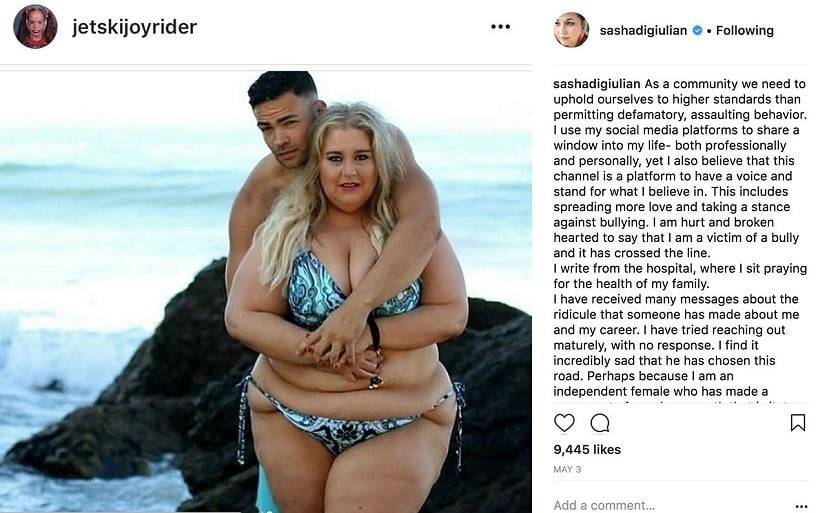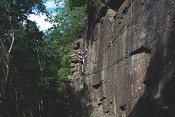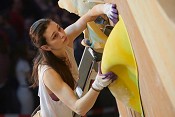
Penny Orr analyses the climbing community's response to a recent incident on social media - a case of cyber bullying which was made public by the recipient of the abuse and brought consequences for the offending athlete. Personalities aside, what's more interesting - Penny suggests - is the mixed reaction to the fiasco...
Joe Kinder recently lost his sponsorship with Black Diamond and La Sportiva due to some of his actions on social media. The extent of his negative behaviour is unclear, but at least two female athletes - Sasha DiGiulian and Courtney Saunders - have come forward to accuse Kinder of persistent bullying. Kinder has offered an online apology, acknowledging that he had overstepped the mark and taking responsibility. While this is certainly a step in the right direction, a significant number of people have defended Kinder in various ways. A seemingly common point of contention is the decision to terminate his sponsorship, with many suggesting that this is too severe a punishment.
Irrespective of the personalities of the individuals involved I think there is an interesting discussion to be had regarding the climbing community's response to these events, in addition to analysing social media and cultural norms more generally. I want to avoid speculation regarding the personal qualities of those involved (as far as that's possible) whilst using this as an example to discuss some wider issues. I ask whether the decision to terminate Kinder's contract is justified, and I look at some of the lessons we can take from this.
What happened?
The full details of what has happened behind the scenes are clearly difficult to ascertain, but I'll try to give an overview of what has appeared online and what we know for certain. On the 3rd of May (2018), Sasha DiGiulian used an Instagram post to accuse Joe Kinder of harassment (the original post called him out by name, which was later edited out). Some hours later Kinder issued an apology, also on Instagram, seemingly taking responsibility for his actions; citing by way of explanation his mischievous personality, and admitting that occasionally his harsh sense of humor crossed the line of what is acceptable, as had happened in this case. Later the same day, Courtney Sanders posted on Instagram that she had also been targeted by Kinder.
Kinder has admitted to using a fake Instagram account to poke fun at fellow professional athletes, as well as other public figures. The account has now been deleted, but the second picture in DiGiulian's post is an example of content taken from the account and was apparently the proverbial straw that broke the camel's back. It features online self-help guru Sarah Saphora - though Kinder did not use her name - pictured in a bikini and is a reference to DiGiulian and her partner (Edu Marin) going on holiday together. Sanders, too, has received hurtful online remarks regarding her appearance. DiGiulian has released some subsequent clarificatory posts (via all her social media platforms), explicitly stating that she had tried to resolve the issue in private, with no success, and that she did not wish for Kinder to lose his sponsorship deals. The subsequent reaction to this state of affairs has been mixed.
Why should we care about any of this?
This recent controversy might be dismissed as merely a falling out between a few people. However, given the way things have unfolded, and that the people involved are very high profile within the climbing world, this dispute has brought several complex topics very much to the fore. People, it seems, do feel strongly about these issues and I'm glad that they do. The fact that there has been so much interest in and so much disagreement about what has happened indicates that there's something worth talking about. We can all agree that bullying is bad, body shaming is bad, no matter whom it targets. But, more interesting than any of the individual posts from DiGiulian, Sanders, and Kinder, is the online community's reaction to them. In my opinion, it's useful to ask whether the online response has been a productive one.
Somewhat unbelievably, DiGiulian has faced criticism from many in the Instagram community, with a significant number of people expressing sympathy for Kinder (I say this is - somewhat unbelievable - because it's not actually all that unbelievable, but more on that below). However, I think it's important to note that malicious and hateful comments have gone in both directions and, for reasons that will become clear, I think this is unhelpful. Rather than rushing to conclusions and writing off the people involved as being either a "snowflake" or a "dickhead", I think it would be better to take a more reflective approach. In the subsections below, I look at some of common threads of the debate that has taken place online.
It's just a joke, what's the big deal?
A common thought among lots of online commentary is that DiGiulian and Sanders "can't take a joke." Admittedly, there can be a fine line between a joke or teasing and genuinely hurtful bullying. Nevertheless, there is a distinction. A joke is playful, it is not meant to hurt anyone and it is intended to make people laugh; in fact, it can strengthen a friendship when it takes place within a strong relationship but crucially, it stops when people get upset. If we take what DiGiulian has said about the situation at face value - and I see no reason not to - we know that this was ongoing harassment, something she obviously wanted to stop, and a situation that she tried to resolve offline and in private. Notably, DiGiulian has regularly spoken out over the years about her struggle to accept her body as an elite athlete susceptible to public scrutiny and judgement. Given the foregoing considerations, we can unequivocally say that Kinder's actions likely cut too deep to be considered "just a joke."
In general, this "snowflake" narrative is harmful in several respects. For instance, it legitimises damaging attitudes and behaviour, and it constitutes an attempt to invalidate the victim's point of view (it's also potentially an example of 'gaslighting' - depending on what you take the precise definition of that term to be - which, broadly, is a label for efforts to undermine a person's trust in their own perceptions). So, not only is this damaging for the specific victims involved, it discourages other victims from speaking out against harassment. Overall, this helps to create a divisive and exclusive environment, a place where not all the members of our community can feel safe. I'm not at all suggesting we should give up on humour, but perhaps we'd benefit from being a little more mindful about what we consider appropriate humour, especially with regards to online content.
Who's bullying whom?
Can it be argued that DiGiulian is herself guilty of bullying of Kinder by drawing attention to his actions publicly? This is precisely what both DiGiulian and Sanders have been accused of by several commentators (the suggestion has also been aired in the UKC Forums). Given the way things have played out, I find the idea that the victims are guilty of tormenting Kinder absurd. Let's remember that these are things he literally said and did himself. Moreover, he was given a chance to deal with the problem in private. Personally, I feel that this is another way for onlookers to shift blame onto the victim. We know, without doubt, that Kinder targeted these women by making value judgements about their physical appearance; something that he has now admitted to and apologised for. DiGiulian and Sanders merely opened up about what had happened; but, obviously, they're bad people for ruining his life!
Is this an example of misogyny?
Everything I've said so far applies to bullying, whether directed at a man or woman. Nevertheless, I feel that Kinder's insults are examples of misogyny, as is much of the online commentary. Let me be clear, though, I'm not making a claim about Kinder's overall character: I think it's entirely possible for a generally decent person to do something horrible. However, I've been challenged on the idea that misogyny has a place in this conversation (and expect to be challenged again after publication), so I will explain why I take it to be so.
The broad definition of misogyny is contempt for, hatred of, or prejudice towards women, whether implicit or explicit. I couldn't possibly say whether Kinder hates women because I don't know him, and it's worth noting that I'd be writing these same words had Kinder been a woman. However, what ultimately matters are the contribution his actions make to the misogynist social environment, irrespective of the motivation behind the attacks on DiGiulian and Sanders. So, it may well be true that Kinder is equally likely to pick on men and women. But, the fact of the matter is that, in these examples, he used body shaming and appearance as a means to insult women. And, because women have been subjected to widespread and systematic oppression throughout history - and are, to this very day, judged more often and more harshly than their male counterparts, especially when it comes to appearance and image - Kinder's actions are inseparable from this context. Hence, the question of whether he would be equally likely to pick on his male colleagues is orthogonal to the question of whether the content of these attacks have a gendered dynamic.
The point I made about a person's actions being inseparable from the cultural context in which they occur is important and often overlooked. Too few people from different types of minority groups feel that they can speak out when they face abuse, harassment, and judgement by different standards. The reasons for this are many and complicated, but excusing an act as being merely a 'joke' or by claiming it has nothing to do with the wider social context in which it occurs is not a helpful way to respond when people do speak out. When this happens, it allows problematic attitudes to go unchallenged by way of plausible deniability.
Here is another interesting question, but one that I won't tackle in this article: To what extent would this situation have played out differently before the #MeToo movement, the Weinstein scandal, and the BBC unequal pay (for the same job) debacle - all of which are opening doors to cultural change?
Did BD and La Sportiva make the right decision?
In my opinion, yes. It's true that Kinder could have been suspended or reprimanded in some other way, but Black Diamond have issued a statement explaining their decision and pointing out that they have a 'zero-tolerance policy.' Notice that this is not equivalent to a 'just-this-once policy'. Employers have a duty of care to their customers, as well as their employees, which includes protecting them from harmful attitudes and denouncing bullying in the strongest terms. Moreover, athletes or 'ambassadors' sign contracts, which I believe Kinder's actions are in breach of (though, I'm speculating here, as I haven't seen BD's athlete contract).
Some have viewed the decision to end their professional relationship with Kinder as a strategic business manoeuvre, merely designed to increase publicity and, ultimately, to drum up customers. While I'd like to think that companies, especially within the outdoor industry, care about social responsibility because the people that run them are normal human beings, on my view, their motivations don't really matter. What matters is that they held a person accountable for bad behavior, sending the message to a wide audience that bullying is unacceptable. It is in the interest of the climbing community to openly talk about this stuff as it happens, because open discussion is the key to improving things.
It is increasingly the case that people are held to account for what they say or do on social media and I take this to be a good thing. (Although, I do not condone 'hate-mobs' or witch hunts.) For example, a man was fired from his job after calling writer Clementine Ford a slut. Ford keeps a blog showcasing some of the misogynist abuse she has received. I recommend having a look, just for the sheer awfulness of it all. Thankfully, the language employed by climbers has largely been far less violent, toxic, and less obviously gendered, but many of the underlying sentiments are similar.
In light of all this, I think that the decision to drop Kinder from the team was the right one and that we should respect this decision. I also believe that it would be wrong to ostracise Kinder from the community altogether. He has paid a heavy price for his actions and I suspect it will be difficult, if not impossible, to fully recover from this. His reputation has been badly damaged, and this is no trivial point: reputation is extremely important, not just from the perspective of individual egos, but because it is foundational for all human altruism and cooperation (see, for example, Wadekind and Braithwaite, 2002), which brings me to my next point.
How should we move on from this?
Kinder acted badly. It's true. Does he deserve to be the subject of a hate-mob? No. In my opinion, we - the community - should respect that Kinder has been punished for his mistakes. That's not to say we should forget about this incident, but it would be more valuable to save our fury and vitriol for the social structures that allow for bullying and discrimination, rather than directing it towards one individual.
But, what does that mean? Well, we all have an obligation to promote a supportive and inclusive community. This is easier said than done, and very likely something which we all could improve on, myself included. Although this obligation matters most for the people who have a platform to influence the community - namely, brands, athletes (the community's so-called ambassadors), and the climbing media - individuals like you and me also have a role to play. Contributing to the discussion in a reasoned and well informed manner is productive, but hurling insults at people we've only encountered online is not; a confrontational approach only serves to anger people and alienate those with different perspectives.
One way to implement these values is to diminish the Online Disinhibition Effect (whereby online behaviour isn't restricted by the kinds of rules governing face-to-face interaction). We can, for example, call people out by name and speak out against bad behaviour, whether it's directed at you or not. We can also refuse to follow fake accounts that harass people and refrain from liking posts with harmful content - even if you find that content amusing, because, let's face it, from time to time mean memes can be quite funny, but that doesn't prevent them from being harassment.
With a little reflection and awareness, we can also try to be aware of our own biases and limit their effects. We all have various biases, and the nature of 'Implicit Bias' is such that you can be an outspoken advocate of equality, whilst in the very same moment behave in biased ways. If you don't believe me, you can test yourself here.
Conclusion
For many readers, this article will be preaching to the choir. But if we want a safe, inclusive and diverse climbing community, we're all responsible for achieving this goal. The most effective way to promote these values is by having open discussion, reasoned debate and encouraging people to be more reflective regarding their own contributions to the community, online and offline.
Interestingly, an article about cyberbullying published on Outsideonline.com (from December 2016) cites Kinder as a victim of an online 'hate-mob', noting that he had contemplated suicide after receiving criticism for cutting down Juniper trees in the Tahoe area. You might think that this would give him cause to think twice before condemning others, but it's often the case that those who are bullied bully others. We shouldn't excuse bad behaviour on this basis, but it is interesting to reflect on how we can break such cycles.
- REVIEW: Julbo Women's Spark Sunglasses 22 Jan, 2021
- REVIEW: La Sportiva Women's Otaki & Skwama 5 Mar, 2019
- REVIEW: Five Ten Access Approach Shoe 19 Oct, 2016
- REVIEW: Mountain Equipment Women's Rock Climbing Range 14 Jun, 2016
- REVIEW: Rab Women's Nebula Jacket 15 Feb, 2016
- REVIEW: Lowe Alpine AT Kit Bag 90l 17 Dec, 2015

















Comments
"If we take what DiGiulian has said about the situation at face value - and I see no reason not to - we know that this was ongoing harassment, something she obviously wanted to stop, and a situation that she tried to resolve offline and in private"
The whole analysis turns on this assumption - that Sasha's reading and reporting of this bullying is accurate. If it is, then I agree you're largely going to be preaching to the choir. But I don't think it's a trivial assumption to make, even in the wake of Kinder's apology - was it heartfelt, or was he merely trying to salvage his relationship with his sponsors? As you say, the line between joking between friends and bullying is a fine one, but I think your analysis of the distinction is maybe a bit brief given how important it is to the context - far crueller things have been done, successfully, in the name of comedy.
We aren't privy to the nature of these communications so I don't think it's possible to give an unbiased assessment either way - and I think that's important. Without it, I have a hard time treating the entire saga as anything other than celebrity rubbernecking.
Am I responding to the response to the response?
Either way, the Yanks are funny folk.
Thank you for reaching out with that.
Great article. People have been using this banter excuse for bullying for too long. Banter is often about power, usually between working class blokes on building sites. If the banteree asks the banterer to stop and he/she doesn't then it is bullying. Kinder can't use the 'she promotes herself too much' excuse because he's a master of that himself. I think he was just jelly or maybe fancies her.
Thank you for your valuable feedback.